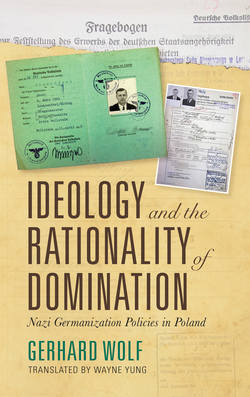Читать книгу Ideology and the Rationality of Domination - Gerhard Wolf - Страница 9
На сайте Литреса книга снята с продажи.
ОглавлениеAcknowledgments to the German Edition
I HAVE ALWAYS been conscious of how fortunate I have been in being able to devote my time—in fact, a long time—to a research topic that had already preoccupied me during my undergraduate studies, and to do so not on my own but with the help of like-minded people, along with a great deal of support from family, friends, and colleagues, as well as a still strong network of institutions that enabled the financing of this work and/or provided the space in which to write it. The circle of those who made these years a stimulating reward for me, and not only intellectually, has constantly grown over the years. It is truly a great pleasure to now have this opportunity to thank them publicly as well.
My first thanks go to my academic supervisor, Michael Wildt. He took up my project when the first steps had already been taken—but it was in conversations with him that it really took shape. His studies of the SS complex and the “Volksgemeinschaft” were crucial for my own research, and our frequent meetings in Berlin and Hamburg offered both an intellectual challenge and a sheltered haven. His inquisitiveness about my work and discussions and constructive criticisms of my hypotheses had a lasting impact on my thinking and repeatedly gave me the necessary self-confidence to embark on the next stage of work.
I would also like to thank Jörg Baberowski, who agreed at very short notice to become the second examiner for this project. His feedback was important for the revisions undertaken before publication. Further thanks go to Gabriele Metzler as the third examiner and to Wolfgang Wippermann, who helped me get this project underway. But for the idea behind it, my gratitude goes to Götz Aly and his trailblazing studies on Nazi population policy. These had already made a deep impact on me during my undergraduate studies, and his extensive archive, which he generously made available to me, allowed me a flying start.
An unfortunate reality for my line of work is that academic research is often a lonely occupation—from searching through the archives to composing the final text. This made it all the more helpful when there were opportunities that allowed me to present my interim results and to also learn from the ongoing efforts of others. In Germany, I would like to specifically acknowledge: the doctoral colloquium of Birthe Kundrus and Michael Wildt at the Hamburg Institute for Social Research, particularly my exchanges with Alexa Stiller, Andreas Strippel, and Regina Mühlhäuser; the invitations to present my project from Hans Henning Hahn, Johannes Tuchel, and Peter Steinbach; and my discussions with Andrej Angrick and Peter Klein.
Very heartfelt thanks go to my new colleagues at the History Department of the University of Sussex, who supported me in every conceivable way during the completion of my dissertation and its later revision. This plunge into the Anglo-American academic world was an immense intellectual enrichment for me. I would also like to mention the opportunity to discuss my work at the University of Oxford’s Modern German Research Seminar, at the Modern German History Seminar of the Institute for Historical Research in London, and particularly at the conference “Beyond the Racial State: Rethinking Nazi Germany,” which was organized by Devon Pendas, Mark Roseman, and Richard Wetzell at Indiana University. For their comments on specific sections of my work, I am particularly indebted to Hester Barron, Donald Bloxham, Paul Betts, Geoff Eley, Dirk A. Moses, and Darrow Schechter.
However, the ones who accompanied this undertaking the longest were my friends: Barbara Fried, who honed my theoretical thinking; Henrike Gremse, who helped me with translations; Christian Ehrlich, who coded a database to help me with my archival research; as well as Juliana and Greg Caplan, Anna Frank, Merle Keck, Steffen Küssner, Daphne Moench, Ilka Saal, Ralf Schweimeier, and Uwe Schulte, who read parts of my work and/or offered me a refuge.
Without the financial assistance of many institutions, I would not have been able to write this work. I would like to thank Manfred Heinemann and the Go East program at the DAAD, the German Historical Institutes in Warsaw and Moscow, and above all, Jan Philipp Reemtsma, Matthias Kamm, and the Hamburg Foundation for the Promotion of Science and Culture, who supported me so generously and unbureaucratically for the longest period of time. This is also why it is a particular pleasure for me that my book has been accepted for publication by the editors of “Studies on the History of Violence in the Twentieth Century” and that it is being published by Hamburger Edition. Here, sincere thanks also go out to my proofreader, Sigrid Weber.
I would also like to thank the staff at the various archives, particularly the German Federal Archives in Berlin, the State Archives in Poznań, and the Special Archive in Moscow. A special thanks also to Martin Dammann and Christopher Nesbit from the Archive of Modern Conflict. And what would I have done without the Berlin State Library?
I have saved my greatest thanks for the end, namely to my parents, Traute and Artur Wolf. They have encouraged my interests since my earliest memories, often sparking them in the first place. This book is dedicated to them.
